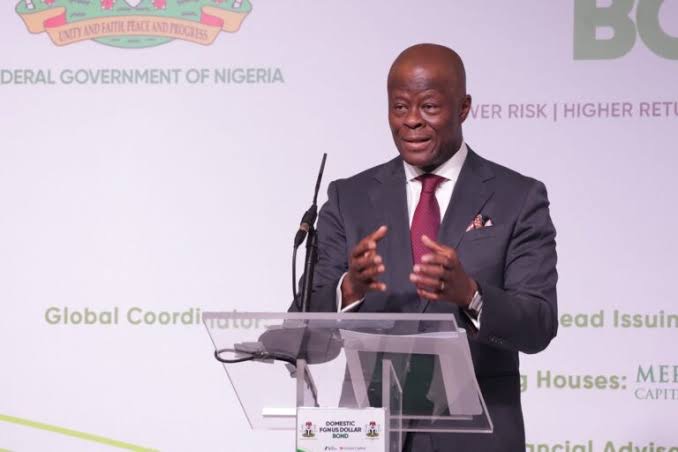The Federal Government is expected to announce the results of the $500 million domestic bond recently offered to Nigerians on or before Friday.
A source close to the deal disclosed the matter to Journalists on an anonymous basis and said the government would make an official statement on the matter.
On August 19, 2024, the Federal Government announced the issuance of $500 million domestic bonds denominated in US dollars with a maturity of five years and a fixed coupon rate of 9.75% per annum.
This means that investors are committed to lending dollars to the Federal Government for five years and receiving 9.75% interest annually.
The offering closes on August 30, 2024, and the results are expected to be announced on Friday. Most analysts surveyed by Business Day said they expect the product to be oversubscribed.

Ayodele Akinwunmi, senior relationship manager, corporate banking group, FSDH Merchant Bank, said, “I expect good outcomes from the fund-raising exercise given the fact the interest rate was good and Nigeria has not defaulted on its loan obligations. In addition, there is no exchange rate risk in the instrument denominated in US dollars. It will help to increase the supply of dollars in the economy which may strengthen the value of Naira.”
CFG Advisory CEO, Tirewa Adebajo shared his expectations with Journalists, predicting that the bond will be oversubscribed.
Uche Uwaleke, a professor of capital markets at Nasarawa State University, said, “I think it will be oversubscribed, given its attractive rate and the fact that the target was high net worth individuals and institutional investors.”
Ayokunle Olubunmi, head of financial institutions ratings at Agusto Consulting, said, “I think it will be oversubscribed.”
According to Ayodeji Ebo, managing director/CBO, Optimus by Afrinvest, the investment was targeted at idle funds in personal accounts, savings of Nigerians abroad, the Nigerian diaspora, and qualified institutional investors. On August 15, 2024, Wale Edun, Minister of Finance and Coordinating Minister for the Economy, said the issuance of the domestic US Dollar bond will increase foreign exchange reserves, a move aimed at stabilizing the exchange rate, controlling inflation, and ultimately lowering interest rates.

The bond will have an annual interest rate of 9.75%, which is very competitive in today’s financial market. An investor who pledges $10,000 will receive $975 in interest per year, paid in the form of $487.50 every six months. Analysts say this semi-annual coupon payment structure will ensure a steady income for bondholders.
The invested capital will be repaid at maturity, ensuring the safety of the original investment. Moreover, because bonds are tax-free, investors can keep all of their income without deductions, making the interest income even more attractive.
According to the Debt Management Office (DMO), Federal Government of Nigeria (FGN) bonds remain an attractive investment option for Nigerians as they offer a unique combination of safety and strong returns. These bonds are particularly attractive to investors seeking a risk-free investment vehicle with many benefits.
One of the main advantages of FGN bonds is that they are risk-free. These bonds are backed by the full reliability and creditworthiness of the Nigerian government, so the safety of the principal is guaranteed. Moreover, interest payments on FGN bonds are tax-free, thus providing investors with a high net return compared to other taxable investment options.
Investors also benefit from the relatively high and stable returns on FGN bonds, especially compared to traditional bank deposits which have low interest rates. Another key advantage is that the principal amount received by investors at maturity can be used as collateral for credit lines from banks and other financial institutions.
FGN bonds offer flexibility if liquidity is required before maturity. Bondholders can instantly exchange their bonds for cash on the Nigerian Stock Exchange (NSE) and the FMDQ OTC stock exchange. This trading option offers important advantages as it allows investors to effectively manage their cash flow needs.
Furthermore, FGN bonds are considered liquid assets for banks when the Central Bank of Nigeria (CBN) estimates liquidity ratios, making them a valuable tool in maintaining financial stability.
FGN bonds provide an alternative source of funding to the government, reducing dependency on external funding and promoting greater self-reliance. This not only helps in diversifying the economy but also strengthens fiscal discipline by providing a non-inflationary means of financing the budget deficit. The issuance of these bonds supports infrastructure development, which in turn has a multiplier effect on diversifying the economy.

































